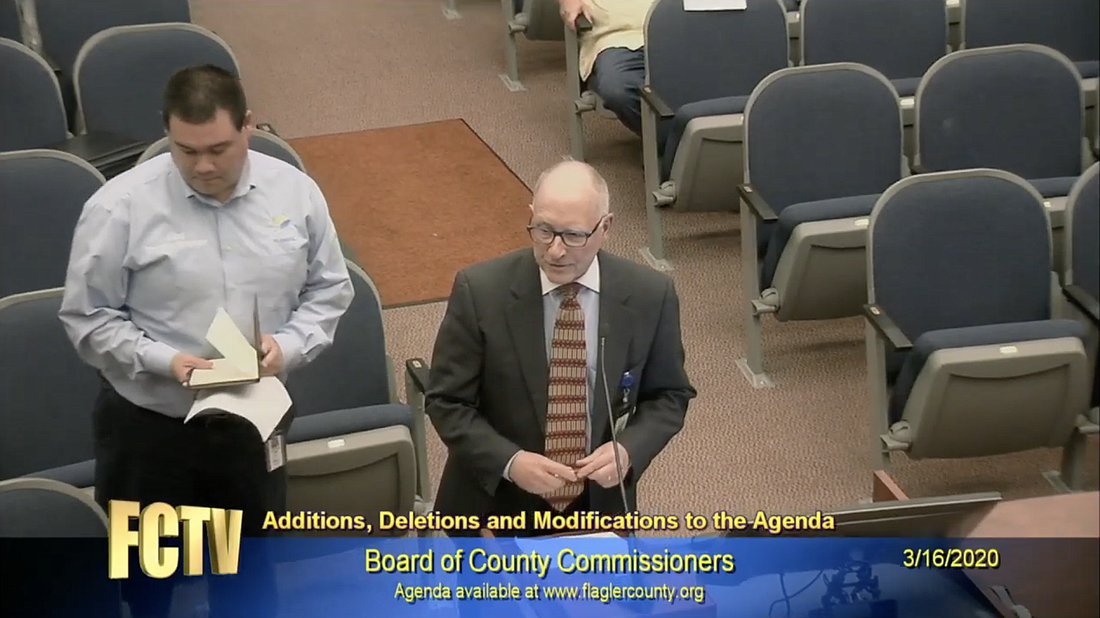- January 20, 2025
-
-
Loading

Loading

Although Flagler County had no known cases of COVID-19 coronavirus when County Commissioners held their regular meeting March 16, commissioners voted unanimously to declare a state of local emergency and urged residents to avoid large gatherings.
"The key is social distancing."
— JONATHAN LORD, Flagler County Emergency Management director
County Emergency Management Director Jonathan Lord told the commission that President Donald Trump had recently advised people to avoid gatherings of more than 10 people. The number of people that authorities are saying constitutes too many has changed rapidly — an example of how quickly recommended responses to the virus have shifted.
"Something I’ve told you is probably wrong by now because things are changing so quickly," Lord said toward the end of his presentation.
"This time last week, the guidance was mass gatherings of more than a 1,000 should not occur," Lord said. "This weekend it became 250, as of the president on the news an hour ago, it is down to 10. ... He really wants people to stay home. He’s saying avoid bars, food courts, restaurants."
And that doesn't just go for people who feel sick: People can contract COVID-19 and remain asymptomatic — showing no symptoms — all the while passing the disease to others. So it helps slow the disease's transmission if even people who feel healthy avoid unnecessary gatherings.
Also over the weekend, Florida Department of Health-Flagler County Administrator Bob Snyder told the commission, the number of known cases in Florida jumped from 42 to 137; as of the evening of March 16, it was 142.
But, Snyder said, "I feel like this weekend was pivotal," because in the county and local cities, he said, "actions have been taken to cancel small or large gatherings."
"That’s what mitigation is all about," Snyder said. "If that continues, I think we have a high, high chance ... that we’ll be successful in watching this virus die. ... We’ve got to keep that up, and encourage that in addition to everyday good hygiene."
Still, he said, "At some point in time, we will have our first confirmed case of COVID-19. When? Don’t know."
But the state will soon — likely by the end of the week — have the capacity to test as many as 625,000 people, he said, with assistance from LabCorps, Quest, various other private testing labs and AdventHealth's lab in Orlando.
"We know what to do. ... Once we do start to see cases in Flagler, we’ll be on it."
— BOB SNYDER, Florida Department of Health-Flagler administrator
That will likely mean an uptick in known positive cases.
Once there's a positive case in Flagler County, the health department will take the lead: Its nurses will interview the patient to determine who they've been in contact with over the 14-day period in which they may have contracted or been shedding the virus, and will then contact those people to see if they're sick and who they've been in contact with.
That process is called "contact tracing," and the health department is accustomed to using it for other illnesses, such as HIV.
"I want our community to know, we know what to do," Snyder said. "We are used to doing this. ... Once we do start to see cases in Flagler, we’ll be on it."
Lord and Snyder have will also hold a phone meeting with assisted living facilities and nursing homes later this week, Lord said, as seniors are at heightened risk from the disease. The facilities have already started reducing visits, Snyder said.
The county is also shutting down nonessential services, such as the county library, while working to provide help to people who had relied on county services that are being reduced or shut down — for instance, the county's adult daycare program, or meals provided at the Wickline Center (which are now being delivered to individuals' homes). The virus could still be circulating as late as July or August, Lord said, citing the president's televised speech.
Although residents should be prepared, Lord said, it's unhelpful to hoard supplies.
"People should be prepared and stocking up, but the whole hoarding three years' of toilet paper, whatever motivates people to do that, this is not the time to do that," he said.
For people who become sick with COVID-19 and have to self-isolate, Lord said, "We can fill in that gap to get people toiletries and meals if they’re locked in."